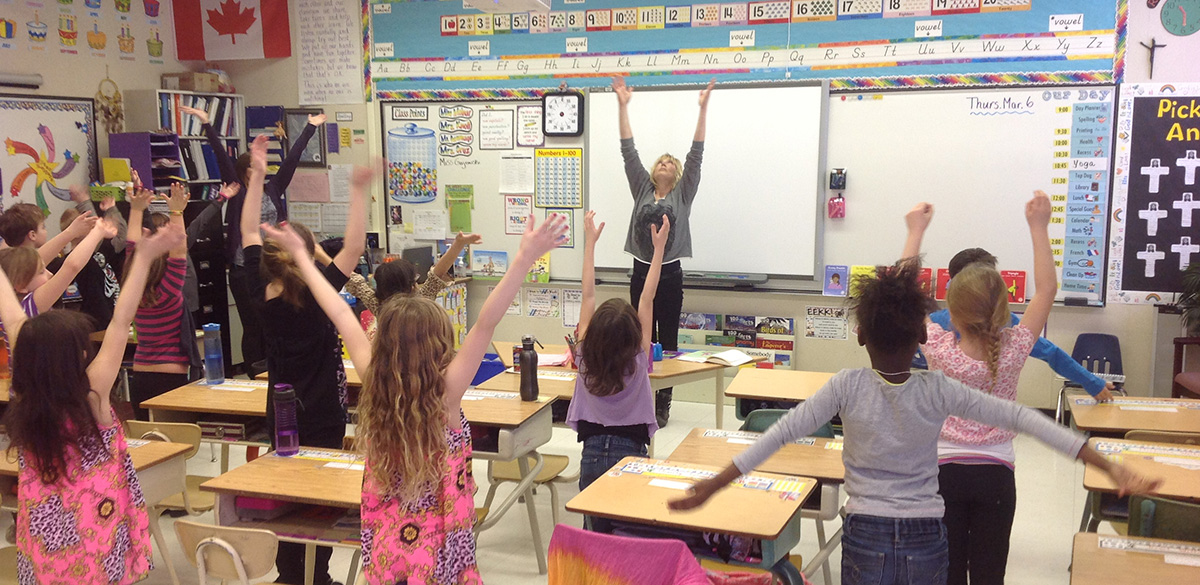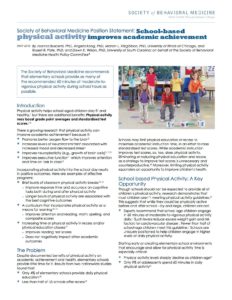
|
Start your Yoga and Mindfulness in the Classroom journey today! Sign Up Now!
|

Tuesday, June 10, 2014 (Updated July 2021)
Did you know that only 4% of elementary schools provide daily physical education and less than half of US schools offer recess? While in its Physical Activity Guidelines Advisory Committee Report (2008) the U.S. Department of Health and Human Services recommends at least 60 minutes of physical activity for all school-aged children, only half of the kids meet this guideline.

Shocking as it is, those are the results of two nationwide studies. That is the reason why the Society of Behavioral Medicine released a powerful statement advocating that elementary schools provide as many of the recommended 60 minutes of moderate-to-vigorous physical activity during school hours as possible.
In their statement, the SBM provides an impressive list of references to research on the benefits of physical exercise on children’s development, well-being, and academic outcomes. Not only does exercise help children stay healthy, but it also aids kids in achieving school success.
The Center for Disease Control and Prevention, in a report that showed the positive associations between school-based physical activity and academic performance, has delivered a similarly powerful message in 2010. Studies reviewed showed that the in-classroom brief physical activity interventions improved the kids’ “indicators of cognitive skills and attitudes, academic behavior, and academic achievement” (p.6).
Supporting the studies on the benefits of physical exercise in general, the studies on school-based yoga for children show improved coordination, focus, and academic achievement.
Recent attempts have been made to investigate the effects of yoga on pediatric obesity and weight management.
A review paper published in 2012 in the Complementary Therapies in Clinical Practice journal summarized the research on the benefits of exercise on such outcomes as obesity, chronic illnesses, and mental health among children. The studies reviewed included yoga and tai chi interventions. “A potential underlying mechanism for the positive effects of exercise, yoga, and tai chi may be the stimulation of pressure receptors leading to increased vagal activity, decreased stress hormones, and increased production of anti-pain and antidepressant neurotransmitters such as serotonin”.
Among the recommended ways to incorporate physical activity into the daily school routine, the SBM mentions “brief bursts of classroom physical activity breaks”, which have been scientifically shown to “improve response time and accuracy on cognitive tasks both during and after physical activity”. Another approach that the SBM enlists involves the implementation of curricula that incorporate exercise as a means for learning, that is, integrates activities with academic learning concepts. This kind of intervention has been shown to improve attention and reading, math, spelling, and composite scores in elementary school children.
Bringing simple and effective yoga-based mindful moments to hundreds of schools, Yoga 4 Classrooms fits with both kinds of programs as prescribed by the SBM. Our curriculum is flexible so that teachers can choose to spend as little as one minute or as many as 30 minutes on mindful moments in their classrooms. With over 200 activities in the Y4C manual and card deck, there are ample opportunities to boost kids’ learning readiness and infuse yoga fun with basic language learning and math concepts, with the added benefit of social-emotional learning skill-building. Once implemented in the school, the program could be expanded to offer both short in-classroom activities, and longer classes during recess and after school.
In addition, Yoga 4 Classrooms meet the national educational standards for health and fitness education, including National Association for Sport and Physical Education (NASPE) Standards and the CDC’s National Health Education Standards (NHES).
The Society of Behavioral Medicine is a multidisciplinary organization of clinicians, educators, and scientists dedicated to promoting the study of the interactions of behavior with biology and the environment, and the application of that knowledge to improve the health and well-being of individuals, families, communities, and populations.
—
Marina Ebert, MA was formerly the Director of Research and Relationship Development for Yoga 4 Classrooms and then a research assistant at the Yale Center for Emotional Intelligence.
Lisa Flynn is the founder of Yoga 4 Classrooms. and author of the Yoga 4 Classrooms Activity Card Deck, Yoga for Children: 200+ Yoga Poses, Breathing Exercises, and Meditations for Healthier, Happier, More Resilient Children, and Yoga for Children-Yoga Cards: 50+ Yoga and Mindfulness Activities for Kids. She is an award-winning national presenter and trainer, school consultant and passionate advocate for youth mental health and the integration of yoga, mindfulness and SEL in education. Learn more about Lisa here.
| Cookie | Duration | Description |
|---|---|---|
| cookielawinfo-checkbox-analytics | 11 months | This cookie is set by GDPR Cookie Consent plugin. The cookie is used to store the user consent for the cookies in the category "Analytics". |
| cookielawinfo-checkbox-functional | 11 months | The cookie is set by GDPR cookie consent to record the user consent for the cookies in the category "Functional". |
| cookielawinfo-checkbox-necessary | 11 months | This cookie is set by GDPR Cookie Consent plugin. The cookies is used to store the user consent for the cookies in the category "Necessary". |
| cookielawinfo-checkbox-others | 11 months | This cookie is set by GDPR Cookie Consent plugin. The cookie is used to store the user consent for the cookies in the category "Other. |
| cookielawinfo-checkbox-performance | 11 months | This cookie is set by GDPR Cookie Consent plugin. The cookie is used to store the user consent for the cookies in the category "Performance". |
| viewed_cookie_policy | 11 months | The cookie is set by the GDPR Cookie Consent plugin and is used to store whether or not user has consented to the use of cookies. It does not store any personal data. |